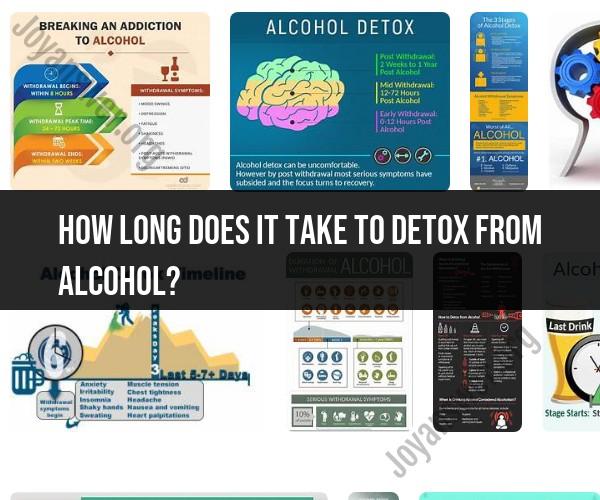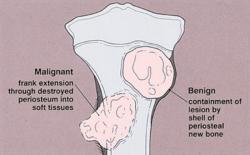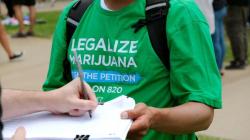How long does it take to detox from alcohol?
The timeline for alcohol detox can vary significantly from person to person depending on various factors, including the individual's level of alcohol dependence, the duration of alcohol use, the amount consumed, and their overall health. Alcohol detoxification is a crucial step in the recovery process for individuals with alcohol use disorder (AUD) and should be done under medical supervision, especially in cases of severe alcohol dependence, as withdrawal symptoms can be dangerous and even life-threatening.
Here is a general timeline for alcohol detox, but remember that individual experiences may differ:
Initial 6-24 Hours: The first signs of alcohol withdrawal often begin within six to 24 hours after the last drink. Early withdrawal symptoms may include anxiety, agitation, nausea, sweating, and tremors.
24-72 Hours: The most severe withdrawal symptoms typically peak between 24 and 72 hours after the last drink. This stage is known as the "acute withdrawal phase" and may include symptoms such as hallucinations, seizures, high blood pressure, rapid heart rate, and confusion. This stage can be life-threatening, which is why medical supervision is crucial.
3-5 Days: After the peak of acute withdrawal, symptoms generally begin to subside. However, some individuals may experience lingering symptoms such as anxiety, insomnia, and mood swings during this period.
7-10 Days: In most cases, physical withdrawal symptoms tend to resolve within a week to ten days. However, psychological symptoms, such as cravings and depression, may persist for a more extended period.
Longer-Term Recovery: The acute withdrawal phase is just the beginning of recovery from alcohol dependence. Long-term recovery involves addressing the psychological and behavioral aspects of addiction, which can take weeks, months, or even years. This often includes therapy, counseling, and participation in support groups.
It's essential to emphasize that detox from alcohol should ideally be conducted under medical supervision, especially for individuals with a history of severe alcohol dependence. Medical professionals can provide medications and medical support to manage withdrawal symptoms safely and reduce the risk of complications.
After detox, many individuals with AUD find that ongoing treatment, counseling, and support are crucial for maintaining sobriety and preventing relapse. Recovery is a complex and individualized process, and seeking help from healthcare professionals and support networks is highly recommended for anyone struggling with alcohol addiction.
Alcohol Detox Timeline: How Long Does It Take?
The alcohol detox timeline can vary depending on a number of factors, including the severity of the person's drinking problem, their overall health, and any other medical conditions they may have. However, in general, the most severe withdrawal symptoms occur within the first 48-72 hours after the last drink, and most people will start to feel better within 5-7 days.
Here is a general overview of the alcohol detox timeline:
- 6-12 hours: Mild withdrawal symptoms may begin, such as anxiety, headache, tremors, and insomnia.
- 24-48 hours: Withdrawal symptoms peak, and may include hallucinations, seizures, and delirium tremens (DTs).
- 48-72 hours: Withdrawal symptoms begin to subside, but some people may still experience fatigue, mood swings, and sleep disturbances.
- 5-7 days: Most people will start to feel better, and withdrawal symptoms will be largely gone.
It is important to note that the alcohol detox timeline is just a general guide. Some people may experience withdrawal symptoms for longer or shorter periods of time. If you are concerned about your withdrawal symptoms, it is important to seek medical attention.
The Road to Recovery: Understanding Alcohol Detox Duration
Alcohol detox is an important step on the road to recovery from alcoholism. It is the process of removing alcohol from the body and allowing the body to adjust to not having it. Alcohol detox can be a difficult process, but it is essential for long-term sobriety.
The duration of alcohol detox can vary depending on a number of factors, including the severity of the person's drinking problem, their overall health, and any other medical conditions they may have. However, in general, most people will complete alcohol detox within 5-7 days.
It is important to note that alcohol detox is just the beginning of the recovery process. Once a person has completed alcohol detox, they will still need to address the underlying causes of their alcoholism and develop coping mechanisms for living a sober life.
Sobriety Journey: Navigating the Timeline of Alcohol Detox
The sobriety journey can be a challenging one, but it is also an incredibly rewarding one. Alcohol detox is an important step on this journey, but it is just the beginning. Once you have completed alcohol detox, you will need to focus on maintaining your sobriety and building a new life for yourself.
Here are some tips for navigating the timeline of alcohol detox and the sobriety journey:
- Seek professional help. There are many treatment programs and resources available to help people through alcohol detox and recovery. A qualified addiction professional can help you develop a personalized plan for your recovery and provide support along the way.
- Take things one day at a time. Recovery is a journey, not a destination. Don't focus on being sober forever. Just focus on staying sober for today.
- Build a support system. Surround yourself with positive people who support your sobriety. This may include friends, family members, therapists, or other people in recovery.
- Take care of yourself. Make sure you are eating healthy, getting enough sleep, and exercising regularly. Taking care of your physical and mental health will help you stay sober.
Remember, you are not alone on this journey. There are many people who care about you and want to see you succeed. If you are struggling, please reach out for help.













